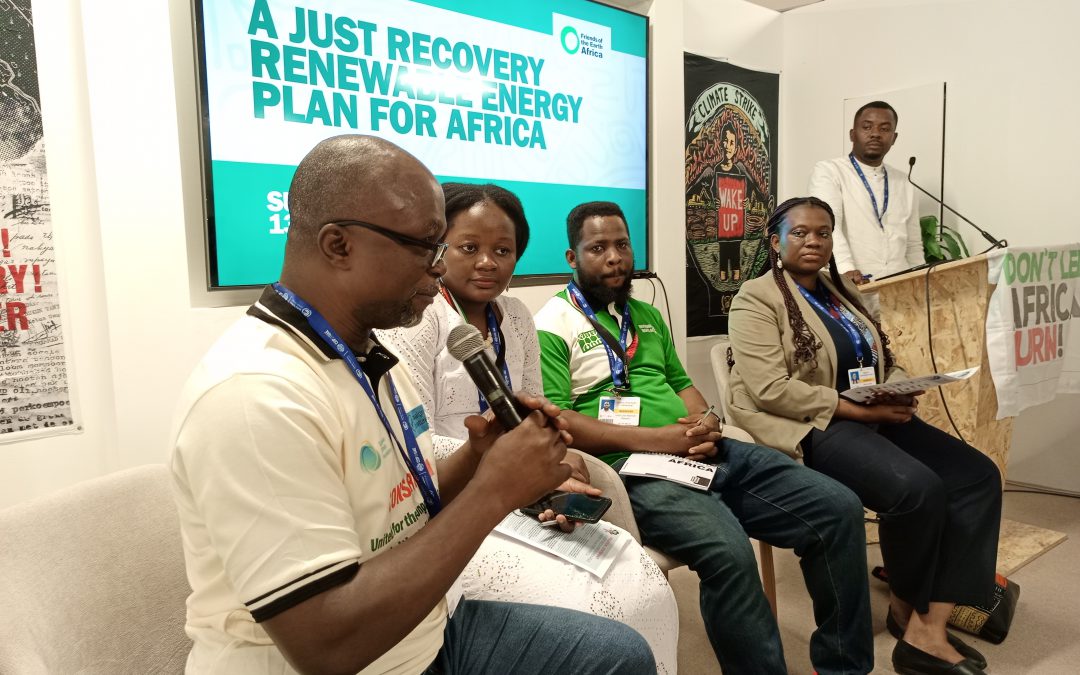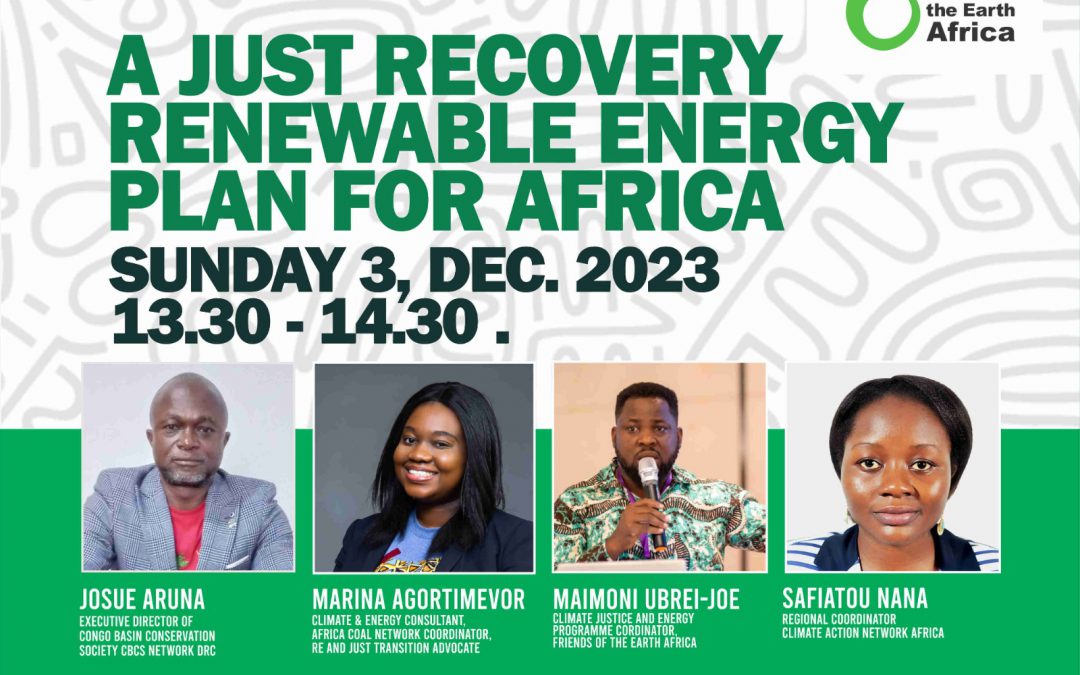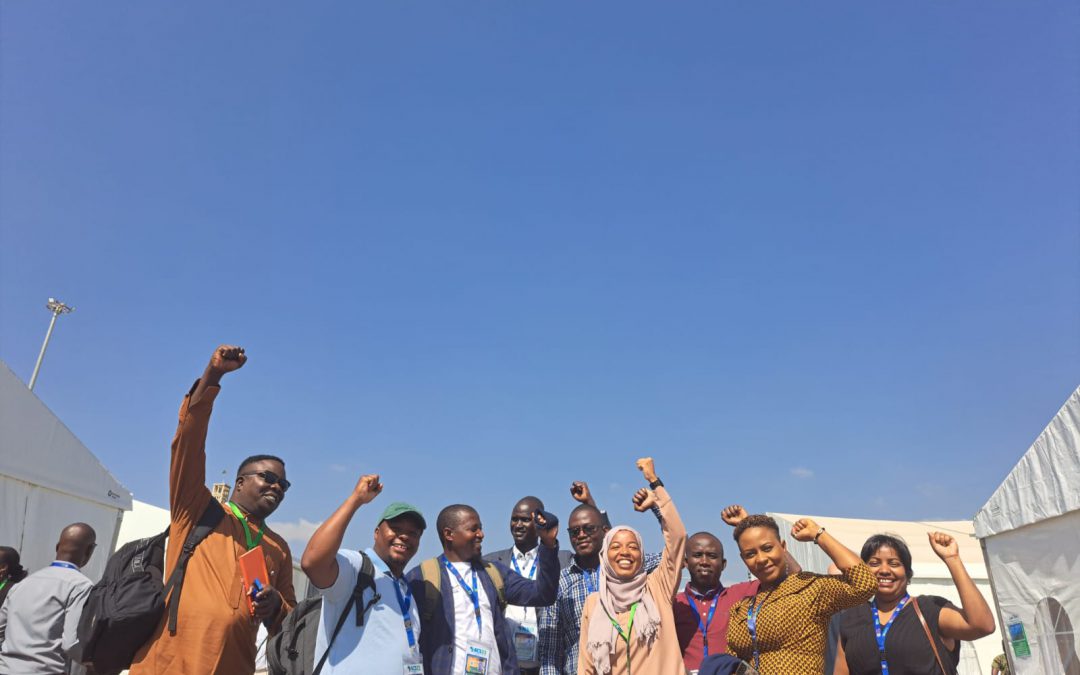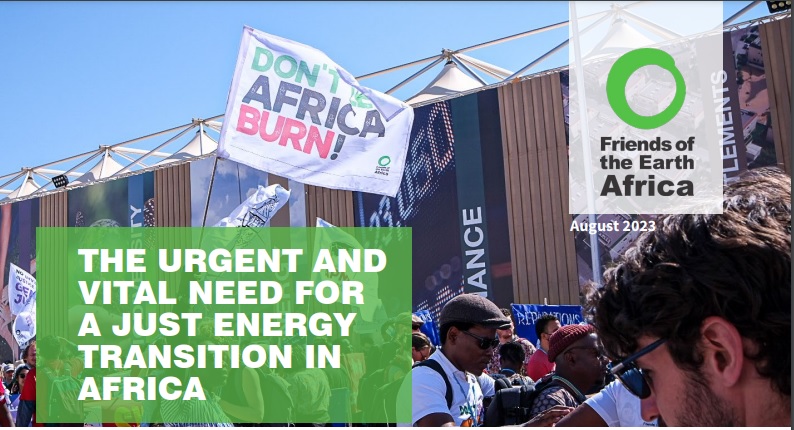
by FoE Africa | Dec 5, 2023 | Uncategorised
A just transition to 100% renewable is possible
That the African continent is suffering from poly crises is no longer news. But of importance at this United Nations Framework Convention on Climate Change COP28 is the climate crisis confronting the continent.
As a result, Friends of the Earth Africa (FoEA) in partnership with Climate Action Network Africa (CAN-Africa) , Africa Coal Network (ACN), Hands of Mother Earth (HOME ) Africa working group against Geoengineering and Environmental Rights Action hosted a side event to review the path to a just transition to 100% renewable energy for Africa.
The event observed that the grave climate change impacts faced by the peoples of the global south especially the African continent that ranges from floods, cyclones, drought, water shortages, desertification, sea level rise, the irreparable and irreplaceable losses and damages and the other indirect impacts such as crude oil spills that have ravaged many communities across Africa, to communal conflicts, and landgrabbing is necessitating this conversation.
Affirming the above, the Intergovernmental panel on climate change (IPCC) have said that if these crisis especially climate crisis is to stop and if we are to limit global average temperature to below 1.5oC above pre industrial levels, we must leave all known fossil fuels underground, phase out not phase down all fossil fuel while transiting equitably, radically and Justly to a new form of energy- clean renewable energy with a shift from the current system of exploitation – hence our quest for system change nor climate change.
In the words of United Nations Secretary general Antonio Guterres on the first day of COP28, – “the world is unequal and divided, bombs are sounding again in Gaza, and climate chaos is fanning the flames of injustice, global heating is bursting budgets, ballooning food prices and upending energy markets and feeding a cost of living crisis, but climate action can flip the switch. We need to be Accelerating a just and equitable transition to renewables. The science is clear; the 1.5°C target is achievable only if we stop the burning of all fossil fuels, a phase out is needed, not reduce, not abate but a phase-out with a clear time frame aligned with 1.5°C. Climate justice is long overdue; developing countries are devastated by disasters they did not cause, extortionate borrowing costs are blocking their national climate action plans and support for developing countries is far too little and far too late. “
Sharing their experiences on a way out of the climate crisis, activists from different parts of Africa spoke up and affirmed that it is urgent for the world to brace up and transition swiftly from dirty energy to renewable energy.
Leading the conversation, Marina Agortimevor, coordinator of ACN stated that if there are barriers to a just transition it means there are opportunities for Africa to engage in other ways to overcome those barriers.
For example, there are about 600 million people, Africans who lack access to electricity – this is an opportunity for Africa considering the huge renewable energy potential of the continent.
Marina pointed out some of the barriers that ACN has identified as possible hindrances to the desired transition to 100% clean renewables as poor access to finance to speed up the transition. She also acknowledged the recently operationalized Loss and Damage Funds here at COP28, and hopes that these funds will be easily accessible by those who need it and will help to reduce this identified gap.
As a trained engineer with hands-on experience of renewable energy, especially solar systems , she raised the need for technology and Knowledge transfer gap to and for Africans to be filled. When this identified gap is filled, we would not be an extraction pot nor would we be a consumer hub but a major player in how we produce energy for Africans and by Africans, she said.
Taking the conversation further Safiatou Nana , regional coordinator of CAN-Africa , spoke on the needs for this transition to embrace a decentralised off grid system which would put management of the energy in the hands of the communities who need and use them. She further emphasised that the transition should consider the cultural context of the over 600 million African peoples who lack access to electricity, and the proper reskilling of workers as important considerations in this process. Collaborations by communities, Civil society organizations and the government, and a good legal framework Nana reiterated would be a boost to the move to 100% renewables.
On his part the Host of the event , Ubrei – Joe Maimoni, the climate Justice and energy lead for FoEA who also doubles as a programme manager for Environmental Rights Action highlighted that without a clearly spelt out policy framework whose goal is measureable, people centred and serve the purpose of the continent with the appropriate budgetary allocations and government support in the form of good political will and transfer of subsidies from the polluting fossil fuels industry to renewables will still be a high hanging fruit process.
He said that we should not allow this transition to be a renewal of energy colonization, and that Africans must be at the center of the pathways to 100% renewables.
There is word out here in Dubai that a decision to triple renewable pledges so we can meet the 100% renewables energy target will be made at this COP28, which posed a question to the peoples in the room , will this pledge light up Africa ? Will it make us another pot of extractions? Or make us a powerhouse of renewable energy tech production? Will this keep us in the loop of consumption and extraction ?
Or will this move us to tech self reliance and equitably just mineral extraction usage?
Josué ARUNA executive director of Congo Basin Conservation Society CBCS network DRC responded to some of the questions raised above, he said aside DRC being a hub where many of the minerals ( now referred to as critical/ strategic/ transition minerals) required for the transition to 100% renewable energy, the government of his country is also been giving out oil blocs to different companies on biodiversity protected zones.
This Josue said is increasing communal clashes, destruction of the ecosystem while the funds being generated is not imparting positively the lives of the people.
The session also examined Article 6 of the Paris Agreement which opens up a window for the adoption of several carbon market schemes and solutions that includes Nature Based Solutions, and several Geoengineering schemes. The panelists emphasized that any solution that does not or will not lead to the cut of emissions at source or keep global average temperatures below the 1.5 o C threshold , lead to massive landgrabbing , colonization of our waters should not be promoted or advanced.
The existing climate change requires a rapid, equitable , just and fair transition to 100% renewables if the world would stay safe from global burning especially Africa and the global south. The time to act is now.
For more information contact :
Babawale obayanju
Communications coordinator
Friends of the Earth Africa.
+2348072051368
owaleseun@gmail.com

by FoE Africa | Nov 29, 2023 | Uncategorised
Friends of the Earth Africa hosts a wide delegation with spokesperson available from the continent of Africa at the UN climate talks in Dubai, 1–12 December 2023.
There is an urgent need for a radical, fare and just phase out of all fossil fuels if Africa is to remain without burning due to global temperature rise and out planet to stay with global temperature limits.
To this end historical polluters, – many “developed nations” such as the US and Europe, must do their fair share of emissions reductions upholding the principle of common but differentiated responsibility, while providing the needed finance to support a just energy transition, adaptation, and Loss and Damage across the continent of Africa and the global south who suffer from grave impacts of climate induced disasters.
We would join comrades from across the world to stand against many of the proposals being pushed in this global policy space – notably in Article 6 of the Paris Agreement concerning carbon markets – which are false solutions to the climate crisis, and have shown to harm communities and ecosystems while delaying real climate action. These include net zero, nature-based solutions, geoengineering, carbon markets, hydrogen, and carbon capture technologies.
Whilst present in Dubai, we will join our colleagues from the Friends of the Earth International (FoEI) alongside other climate justice movement worldwide, to stand in solidarity with oppressed peoples in the UAE, across the Middle East and the world.
Activities
Thursday 30 November
Press conference: FoEI demands and expectations for COP28
Line-up of speakers from Friends of the Earth groups worldwide
Room: Press 2, Zone B6 – Building 77
Time: 11.00-11.30 (GMT+4)
Sunday 3 December
Event: A Just Recovery Renewable Energy Plan for Africa
Hosted by Friends of the Earth Africa
Room 1, Climate Justice Civil Society Hub, Blue Zone
Time: 13.30 – 14:30 (GMT+4)
Friday 8 December
Press conference: FoEI analysis on week one & expectations for week two
Line-up of speakers from Friends of the Earth groups worldwide
Room: Press 2, Zone B6 – Building 77
Time: 14.00-14.30 (GMT+4)
Saturday 9 December
Photo opportunity: Global Day of Action on Climate Justice
People raise their demands for climate justice through coordinated actions at the COP venue and around the world, all day.
Sunday 10 December
Press conference: Litigation to fight climate change & corporate power
Line-up of speakers from Friends of the Earth groups worldwide
Room: Press 2, Zone B6 – Building 77
Time: 16.00-16.30 (GMT+4)
Monday 11 December
Event: Freeing ourselves from the “net” – Course correcting climate action to Real Zero
Speakers from FoEI, FoE Sri Lanka, Corporate Accountability, Global Forest Coalition, Institute for Socioeconomics Studies
Room: SE Room 3
Time: 16:45-18:15 (GMT+4)
Tuesday 12 December
Press conference: FoEI closing comment on COP28
Line-up of speakers from Friends of the Earth groups worldwide
Room: Press 2, Zone B6 – Building 77
Time: 12.00-12.30 (GMT+4)
Spokespeople & media contacts
Ubrei-Joe Maimoni Climate Justice and Energy Programme coordinator, FoEAfrica maimoni[at]foei.org Whatsapp +2348063894925 In Dubai for week one.
Tyler Booth, Climate justice & energy Coordinator, FoEI
tyler[at]foei.org, Whatsapp/Signal +27 64 654 8464, X @TylerJess38
In Dubai for both weeks, speaks English
Sara Shaw, Climate justice & energy Coordinator, FoEI
sara.shaw[at]foe.co.uk, Whatsapp/Signal +44 79 7400 8270, X @climatemouse
In Dubai second week only, speaks English/Spanish
To arrange interviews, contact: Babawale Obayanju, Communication coordinator, FoEAfrica owaleseun[at]gmail.com Whatsapp +2348072051368 In Dubai from 1-12 Dec.

by FoE Africa | Nov 16, 2023 | Uncategorised
The latest Global Oil and Gas Exit List (GOGEL) just published by Urgewald, tells a damning story of the oil and gas industry, which continues to support new oil and gas projects in the midst of our climate emergency. The updated GOGEL is supported by the Life after Coal Campaign and more than 50 partners from around the world. It is a critically important resource for all those working towards environmental and climate justice around the world.
“With Africa having contributed the least towards global warming yet bearing the most severe impacts of a rapidly changing climate, it is important for civil society here and around the world to have access to updated, well-researched data,” says Bobby Peek, Executive Director of groundWork, part of the Life After Coal Campaign. “This information enables us to challenge companies over the continued irresponsible exploitation of oil and gas reserves and unchecked profiteering at a time when the world is descending into climate chaos,” says Peek.
Findings
The GOGEL is a global audit covering 1,623 companies active in the upstream, midstream or gas-fired power sector which accounts for 95% of global oil and gas production. Key findings include:
- 96% of upstream companies on the GOGEL are still exploring or developing new oil and gas fields;
- Global gas-fired capacity is expected to rise by a staggering 30%; and
- The global oil and gas industry is planning to increase liquified natural gas (LNG) export capacity by 162%.
Nils Bartsch, Head of Oil & Gas Research at Urgewald says, “The magnitude of the industry’s expansion plans is frightening. To keep 1.5 °C alive, a speedy, managed decline in oil and gas production is vital. Instead, oil and gas companies are building a bridge to climate chaos.”
Exploration and Expansion
Starting with exploration, the GOGEL shows that, amid the climate crisis, 96% of the 700 upstream companies listed are still exploring or developing new oil and gas fields. Since 2021, industry’s annual capital expenditure on oil and gas exploration has risen by more than 30%. Over the past 3 years, oil and gas companies in the GOGEL database spent a total of US$ 170.4 billion on exploration for new oil and gas reserves that we cannot afford to burn.
In addition to exploration, the GOGEL reveals extensive and reckless upstream expansion with 539 companies preparing to bring 230 billion barrels of oil equivalent (bboe) of untapped oil and gas resources into production.[1] These short-term expansion plans severely jeopardize efforts to limit the global temperature increase to 1.5 °C.
Oil and gas expansion in ‘frontier’ countries will create new fossil fuel dependencies, severely compromising, if not displacing Just Energy Transitions which could see cheap and rapid builds of renewable energy for countries that are not yet locked into expensive and polluting oil and gas dependencies.
Companies on GOGEL are exploring or developing new oil and gas resources in 129 countries. TotalEnergies tops the list with expansion in 53 countries, including South Africa, Namibia, Mozambique and Papua New Guinea. These countries currently have little or no oil and gas production,[2] which should therefore make transition easier.
“Oil and gas companies like TotalEnergies, Shell, and their local partners are spending billions of dollars to lock African countries into a fossil gas future. Gas is not a viable energy option for Africa. It is dirty, expensive, and most new projects will take 5 – 7 years to build before they can make any contribution to energy security. What we need is a just transition to affordable and renewable energy for all,” says Leanne Govindsamy from the Centre for Environmental Rights.
New Gas Infrastructure and Gas-fired Expansion
In relation to gas infrastructure, the 2023 GOGEL covers all companies that are developing new liquefied natural gas (LNG) terminals, and it provides disaggregated data for the expansion of LNG export and import capacities.[1] According to the database, companies are planning to increase global LNG export capacity by 162%.[1] New LNG export terminals are key drivers of large-scale gas extraction in countries like the US, Qatar, or Mozambique. In the case of South Africa, foreign companies are driving the development of new LNG terminals and infrastructure that capture public funds and yet more debt for large scale extraction, thereby disrupting the country’s efforts to build local industry and renewable energy that will ensure energy security needed for economic recovery.
In terms of gas-fired power, the 2023 GOGEL for the first time provides data on companies’ gas fired power expansion plans. In total, GOGEL identifies 651 companies that are planning to develop an additional 567 gigawatt (GW) of gas fired power capacity in the midst of the escalating climate crisis. If built, these projects would increase the world’s installed gas fired capacity by 30%.[3] A substantial part of the global gas fired power build out would rely on expensive imported LNG.
Nils Bartsch of Urgewald explains that, “The industry likes to frame fossil gas as the cleaner successor to coal and a bridge fuel for the energy transition. This is a flawed fossil fantasy. If life cycle emissions are properly factored in, fossil gas can be just as harmful to the climate as coal.”[4]
Are financial institutions ending or perpetuating oil and gas expansion?
With every decision to drill a new well, companies are locking us into a path towards disaster. Fossil fuel emissions hit a record high last year, yet oil and gas companies like Shell, TotalEnergies and BP quickly rolled back their already weak climate pledges in 2023 showing once again that profit goes before planet.[5] The oil and gas industry’s so called climate action amounts to little more than a competition in dodging accountability, making empty promises and spreading misinformation.
“Financiers and investors need to face the fact that this industry will not transform voluntarily. Private and public financial institutions, insurers, regulators and central banks must adopt policies that end the financing of fossil fuel expansion. GOGEL provides the data needed to develop and implement these policies. Without swift action, the chance for a 1.5 °C world will be irredeemably lost,” says Katrin Ganswindt, Head of Finance Research at Urgewald.
For more details on the investors behind fossil fuel companies, see Urgewald’s database “Investing in Climate Chaos”: https://investinginclimatechaos.org. Read CER’s statement on the Investing in Climate Chaos, here.
For information on the companies and investors covered by the research and details on the methodology deployed, visit: www.gogel.org.
For further information, contact:
Lerato Balendran Life After Coal +27 (0)79 071 7442 lbalendran@cer.org.za
Tsepang Molefe groundWork, SA +27 74 405 1257 media@groundwork.org.za
Nils Bartsch Urgewald +49 30863292274 nils@urgewald.org
Dr Ognyan Seizov Urgewald +49 30863292261 ognyan.seizov@urgewald.org
[1] The GOGEL short-term expansion metric includes resources categorized by Rystad Energy as “in field evaluation” and “under development.” Companies will start producing these resources in the near future (next 1 – 7 years).
2 S&P Global: https://www.spglobal.com/commodityinsights/en/ci/research-analysis/closing-door-or-window-of-opportunity-for-frontiers.html.
3 Data on operating gas-fired power capacity retrieved from Global Energy Monitor (GEM), Global Gas Plant Tracker (February 2023): https://globalenergymonitor.org/projects/global-oil-gas-plant-tracker/.
4 Gordon et al. 2023: Evaluating net life-cycle greenhouse gas emissions intensities from gas and coal at varying methane leakage rates.
5 https://www.euronews.com/green/2023/06/15/shell-joins-bp-and-total-in-u-turning-on-climate-pledges-to-reward-shareholders

by FoE Africa | Sep 11, 2023 | Uncategorised

NAIROBI, September 6, 2023 Friends of the Earth Africa joined leaders and comrades from across the African region and the world for the inaugural Africa Climate Summit (ACS) in Nairobi, Kenya, which was held from 4th to 6th September 2023 to discuss Climate change, climate finance, and Africa’s energy future. The three-day summit, whose agenda was drafted by profit-driven organizations from the global North and laden with Carbon Markets ideas, ended with the African Leaders’ Nairobi Declaration on Climate Change and Call to Action adopted by African Heads of State and Government in the presence of global leaders and high-level representatives on the closing day.
Yegeshni Moodley, Climate and Energy Justice campaign lead at Friends of the Earth South Africa observed that “the climate week was missing the local voices that are most impacted by climate change. Their stories of hope, perseverance, suffering, and disaster were glaringly absent, hidden away behind security barriers and military armament. The use of top-down, technocratic false solutions negates the value of local knowledge and traditional practices that have sustained generations on their land. We must decry and lament the situation Africa has been placed into, where her lands and riches are once again being sold away to the distress and poverty of her people.”
The declaration, which falls short of the expectations of the people and civil society organisations, is not a surprise, as the various dangerous clauses embedded in the document have revealed the truth about these concerns. The summit sessions hammered out the multiple ways to institutionalize carbon markets on the continent. This is a dangerous distraction from the much-needed rapid and just transition away from fossil fuels if we stay below 1.5 degrees.
“We were already worried going into the Africa Climate Summit, that the agenda of the Summit had been influenced heavily by McKinsey and US corporate interests. Africa is highly vulnerable to the ravages of the climate crisis, but it seems the voices of Africans are being ignored. Instead of a people-based renewable energy system and strengthening peoples’ rights, we are seeing more fossil fuels and carbon markets, and we denounce these moves.” said Anabela Lemos, Director, Justiça Ambiental, Mozambique.
In a further reaction, Maimoni Mariere Ubrei-Joe, Coordinator of the Climate Justice, and Energy Program, Friends of the Earth Africa said: “Existing policies in Africa can be effective if they are backed by concrete actions. We cannot keep using the same old extractivist model and expect a different result. What should be Africa’s focus now is to stop the contributors to climate change at source and not look for shortcuts to keep extracting using the smokescreen of the carbon market, geoengineering, and other false solutions.
Africa must champion a people-led and centered Just energy transition to 100% renewable energy with utmost care for the environment. African energy systems should be developed to meet the needs of the continent rather than thinking only of energy for export. Our energy sovereignty is paramount if we are to grow and move forward. This Nairobi declaration is short of these ideas and could be another beautiful document heading for the shelves.
“Africa urgently needs scaled-up real climate finance solutions to enact a fair and just transition away from fossil fuels towards sustainable renewable energy. At the forefront of Africa’s just transition must be the need to increase energy access and sufficiency across the continent. The dash for Africa’s transition minerals cannot replicate the extractivist dirty energy model that puts profits over the people and planet. Nor can this extraction be led by neocolonial pursuits by the Global North. Any exploitation of Africa’s critical mineral resources needs to recognize the rights of Africa’s indigenous people and local communities and ensure that their energy access needs are a priority in the transition” said Tyler Booth, CJE International Programme Coordinator, FoEI
Africa’s natural habitats and ecosystem must not be commodified and reduced to their role as carbon sinks, but recognized for the intrinsic value they have to ecosystems and the people who rely on these ecosystems functioning. Africa does not need carbon markets; it needs real climate finance”, Tyler added.
The dash for Africa’s transition minerals cannot replicate the extractivist dirty energy model that puts profits over the people and planet. Nor can this extraction be led by neocolonial pursuits by the Global North. Any exploitation of Africa’s critical mineral resources needs to recognize the rights of Africa’s indigenous people and local communities and ensure that their energy access needs are a priority in the transition. The adoption of the language “phase down of coal” and no mention of the phase-out of fossil fuels by declaration is a pointer to the value it places on the people of Africa who bear the brunt of the climate crisis.
The conference included further discussions around the blue economy, agriculture, and nature and biodiversity.
Mariann Bassey Oruwvuje, FoE Africa, Food Sovereignty coordinator said:
“We call on our African leaders to meet their human rights obligations and to listen to the requests of the affected communities and people! Governments and intergovernmental organisations must immediately stop any policies, which lead to violations of the human right to food. We demand public policies in favour of farmers’ seed systems. The Nairobi Declaration must prohibit monopolies, and favour instead agroecology, access to land, and good care of the soil. Farmers themselves are agricultural experts and they must be in the driver’s seat of agricultural development at all times! We must prioritize people over profits, and continue to promote and defend agroecology and farmers’ seeds, which represent the hope and future of humanity.
Rita Iyke Uwaka, Forest and Biodiversity coordinator, FoE Africa, said:
Africa should double its agricultural production and productivity with a focus on community-based and smallholder farmers’ agroecological systems while supporting intra-African agricultural business between the people and the smallholder and community farmers, and creating spaces for knowledge sharing. We must stop the harmful expansion of monoculture plantation systems and related deforestation, watershed, and soil degradation. Ensure that at least 30% of African land and at least 30% of the African ocean and seas are conserved or protected by 2030; with a rights-based approach.
She further added that we must support African leaders to stop any harmful carbon market laws that will violate the people’s rights, and aid livelihood losses and ecosystem destruction.
For more information or clarification, you can reach:
Babawale Obayanju, Communications Coordinator, Friends of The Earth Africa waleseun@erafoen.org +2348072051368
Or Maimoni Mariere Ubrei-Joe, Climate Justice and Energy Coordinator, Friends of the Earth Africa maimoni@foei.org

by FoE Africa | Aug 29, 2023 | Uncategorised

by Babawale Obayanju and Ubrei – Joe Maimoni Mariere
Africa, home to one-fifth of the global population, has contributed about 3% of the world’s carbon dioxide (CO2) emissions, representing the lowest emissions per capita[1] among regions. Yet, the continent faces the most devastating consequences of climate change, exacerbated by the COVID-19 pandemic and geopolitical conflicts. This opinion piece delves into the crucial intersection of the climate crisis, energy systems, and the imperative for a just feminist transition in Africa, urging African leaders and global stakeholders to embrace an equitable approach to safeguard the environment and uplift communities.
Africa’s Climate Plight: A Call to Action
While Africa’s carbon contribution is comparatively minor, its vulnerability to climate impacts is immense. Recent events, such as the 2022 Nigerian floods and Cyclone Idai’s devastation in Mozambique, Zimbabwe, and Malawi, underline the urgent need for comprehensive climate policies. These incidents, disproportionately affecting marginalized communities, emphasize the necessity for immediate and ambitious climate mitigation strategies.
Energy Predicament: Balancing Need and Sustainability
Amid the climate crisis, Africa’s energy landscape presents a formidable challenge. Millions on the continent lack access to reliable electricity and clean cooking facilities, thus contributing to energy poverty. The Russia-Ukraine conflict, however, threatens to undermine progress, with both Northern and African governments seeking to expand their search for oil and gas on the African continent. The African Union’s stance on incorporating fossil fuels in energy access raises concern, as it contradicts the global push to drastically reduce the global average temperatures below 1.5oC while moving towards clean renewables. Europe’s wavering commitment to gas in its own energy mix while bolstering fossil fuel investments in Africa risks exacerbating environmental degradation, and climate injustice, and furthering the patterns of neocolonialist extractivism on the continent.
The Just Transition, False Solutions, and Sustainable Progress
Friends of the Earth Africa believes that Africa holds unparalleled potential for harnessing renewable energy sources, including solar and wind, which could transform its energy landscape. However, the challenge lies not only in adopting clean energy but also ensuring an equitable transition process. The transition must prioritize protecting ecosystems, local livelihoods, and communities while providing universal access to energy. Grassroots resistance in South Africa and Mozambique against harmful energy projects exemplifies the imperative for environmentally conscious development.
Amid the race to combat climate change, Friends of the Earth Africa says caution must be exercised against embracing false solutions – in the form of carbon markets, offsets, and removals – as is shown on the agenda of the upcoming Africa Climate Summit where it is planned to operationalize the carbon market initiative, proposed by McKinsey and company an American consulting company in collaboration with Sustainable Energy for All, the Global Energy Alliance for People and Planet and the Rockefeller Foundation.
This will compromise the environment and vulnerable communities. Geoengineering initiatives like solar radiation, sky whitening, ocean fertilization, and ill-conceived ‘nature-based solutions’ risk masking the deep-rooted changes necessary for meaningful emissions reduction. Instead of relying on carbon markets and offsets, a people-led energy revolution grounded in clean renewable, democratic, and locally informed solutions is imperative.
Financing the Just Transition Agenda for Africa’s Energy
The forthcoming Africa Climate Summit (ACS) holds immense potential to redefine Africa’s energy future. Friends of the Earth Africa urges the all participating government and leaders to prioritize a just transition to renewable energy, advocating for a complete phase-out of fossil fuels and halting new dirty energy projects. The focus should be on clean, safe energy sources, respect for indigenous and community rights, safeguarding biodiversity, and minimizing environmental harm. ACS must reject all false narratives that support gas as a transition fuel and any form of false solutions – carbon markets, offsets, and removals in Africa. This approach will decentralize energy access, bridging the gap between rural and urban areas.
Addressing the historical climate debt owed to Africa is essential for equitable progress. Funds should flow into the Loss and Damage finance mechanisms established at COP27, free from loans or insurance that could exacerbate economic imbalances. Utilizing existing funds, including those hidden in tax havens, could fuel Africa’s renewable energy revolution. A successful transition hinges on simultaneously addressing climate debt and inequality, buttressed by favorable political and economic conditions.
As Africa seeks a renewable future, responsible mineral extraction is vital. Safeguarding communities, livelihoods, and environments from further harm demands cleaner and safer extraction methods. Balancing resource demand with environmental stewardship will require strong labor rights, collective organizing, and worker retraining, ensuring that progress benefits all.
Conclusion
The Africa Climate Summit has the potential to redefine Africa’s trajectory in confronting the climate crisis. By centering on a just energy transition, the summit can foster equitable development, clean energy access, and environmental stewardship. As Friends of the Earth Africa, we believe urgency is undeniable: Africa’s challenges are global, and the continent’s success in navigating the energy crisis can serve as a blueprint for a sustainable future worldwide. In the end, the pursuit of a just transition is not only Africa’s responsibility but a collective endeavor for a more resilient and harmonious planet.
[1] https://www.iea.org/reports/africa-energy-outlook-2022/key-findingshttps://www.iea.org/reports/africa-energy-outlook-2022/key-findings
Photo Credit : Sharon Pittaway on unsplash.com










